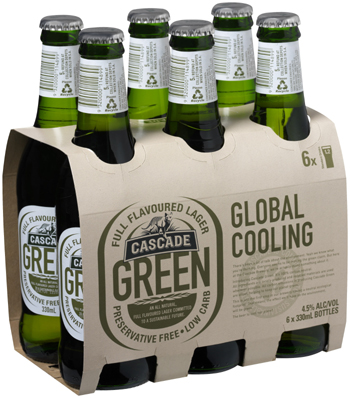Foster’s new “green” beer
Cashing in on the environmentally-friendly image of Tasmania, Foster’s Group has launched Cascade Green, a beer which is 100 percent carbon neutral from the picking of hops to the eventual deposit in the recycling bin.
It must be the onset of old age why this news makes me so grumpy. I, for one, can still remember a time when green beer was something that brewers worth their mettle were not supposed to serve their customers. If they did, you were allowed to pour it down their throats.
Now “green” beers seem to be all the rage. Especially if they come from Tasmania, an island south of Australia renowned for its lush green wilderness. In March Foster’s launched Cascade Green, by all accounts a low-carbohydrate premium beer that is “green”. Excuse my pettiness of putting it in inverted commas, but what’s really “green” about a “green beer”? Although Foster’s isn’t claiming the ingredients are organic or vegan or suchlike, it suggests all are locally sourced from Tasmania. To add to its “green appeal”, Cascade Brewery which is a pretty old-time brewery near the city of Hobart, has already reduced its energy usage by 16 percent and water usage by 30 percent per unit of production over the past six years.
Cascade Green will travel to drinker’s lips courtesy of what is said to be the lightest weight, highest recycled content glass bottle currently available in Australia. Cartons of the beer will cross the country in 100 percent recycled cardboard printed with two-colour biodegradable vegetable inks.
Ok, but what’s new about that? Many breweries the world over are engaged in that sort of thing.
What is to make Cascade Green greener than green is that all the greenhouse gases produced through the life of Cascade Green are being offset. This is achieved by buying certified carbon offsets from the Hobart Landfill Flare Facility (a government-accredited operation) which captures and recycles gases. All activities from growing the hops to recycling the empty bottles after consumption of the beer are covered by the scheme, the cost of which will not be passed onto the consumer.
To me this means that Cascade Green is not “green” at all. It is not a zero-emissions beer, which would warrant a green labelling. Cascade Green only does what has become a major marketing ploy by many electricity providers, which have begun selling “green” electricity. The electricity that comes out of the socket in your house is still produced by the environment-polluting coal-fired power plant. But thanks to a lively trade in certified carbon offsets it has miraculously been turned “green”.
Does the consumer like to be fooled?
Or are we witnessing the return of the medieval letter of indulgence in its contemporary form as carbon offset? If memory serves me right, it was in the 15th century that people bought letters of indulgence so that after their death they did not to have to roast in purgatory for their sins.
I must be getting old indeed.
Ina Verstl

